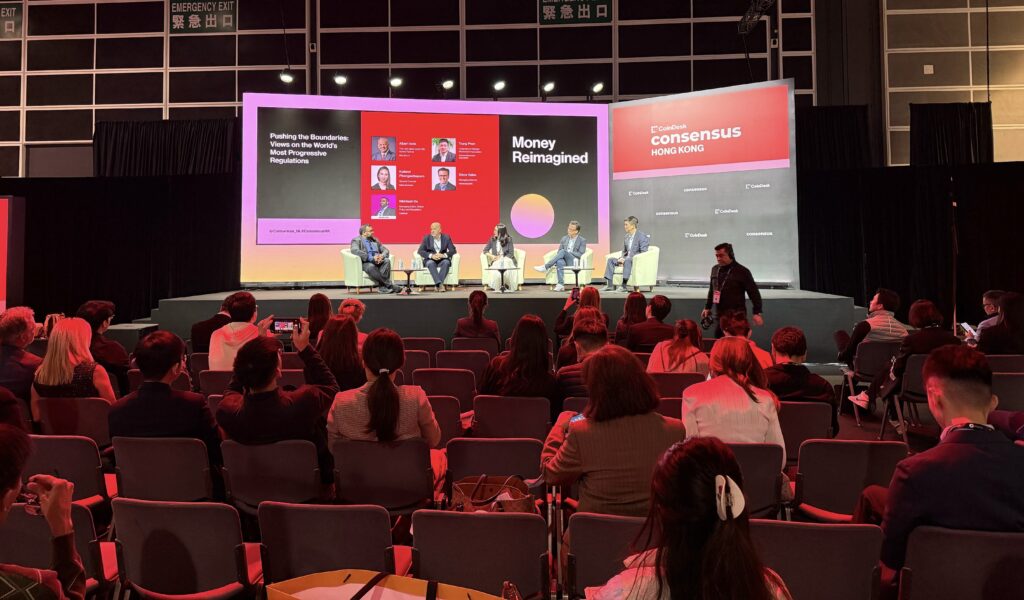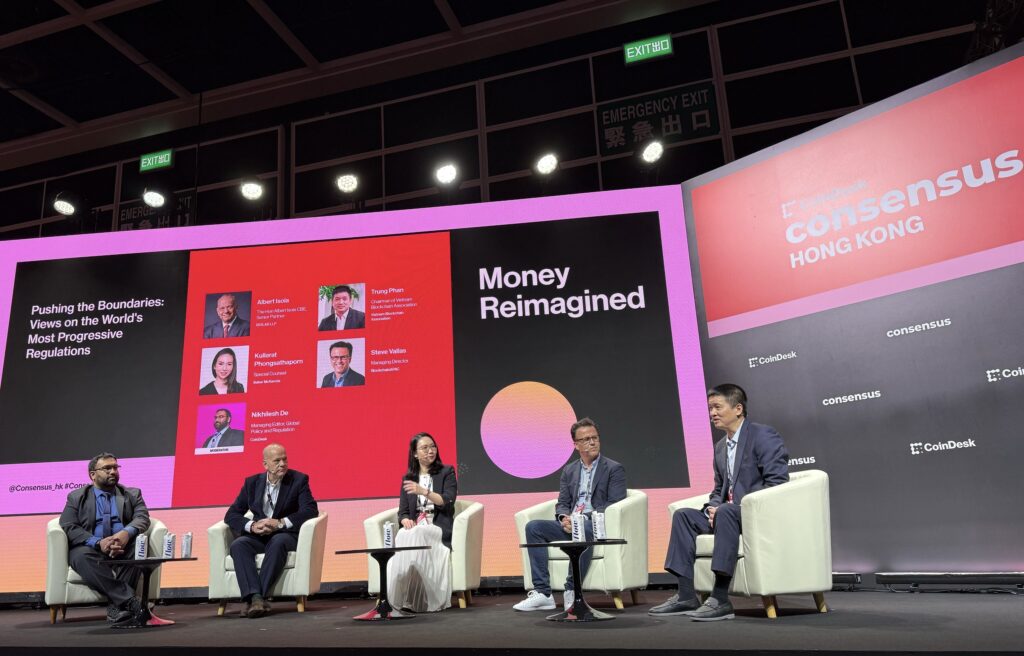From February 18-20, 2025, Mr. Phan Đức Trung, Chairman of the Vietnam Blockchain Association (VBA), participated in Consensus Hong Kong 2025, one of the leading global conferences on Blockchain and Fintech. The event gathered over 10,000 delegates from more than 50 countries, including experts, businesses, and investors, with the aim of fostering international cooperation and guiding the future development of blockchain technology.
As part of the conference, Mr. Trung joined a panel discussion titled “Pushing the Boundaries – Views on the World’s Most Progressive Regulations”, alongside international experts, including Mr. Albert Isola, former Minister of the Government of Gibraltar and a key figure in the development of the first legal framework for Distributed Ledger Technology (DLT); Ms. Kullarat Phongsathaporn, Special Advisor at Baker McKenzie and a leading expert on fintech and blockchain in Thailand; and Mr. Steve Vallas, Director of Blockchain APAC, one of the blockchain pioneers in Australia.

During the discussion, Mr. Trung emphasized the importance of a transparent and clear legal framework for digital assets. He stated that Vietnam’s anticipated passage of the Digital Technology Industry Law (CNCNS) in May 2025 will provide a solid legal foundation, driving the development of the digital economy and enhancing Vietnam’s international standing.
“Vietnam fully supports the establishment of this legal framework. The CNCNS law will not only attract foreign investment but also create a favorable environment for domestic businesses to grow sustainably. Specifically, the law will contribute to enhancing the liquidity of Real-World Assets (RWA) and encourage long-term investment flows”, Mr. Trung affirmed.

Additionally, Mr. Trung expressed concern about the rise of meme coins, a form of cryptocurrency created for entertainment purposes, which has become increasingly popular in the market. He pointed out that while meme coins may raise awareness of blockchain in developed countries such as the US and the EU, their issuance in developing nations, especially in Southeast Asia and Africa, could become a tool for unregulated fundraising.
He also introduced ChainTracer, a program developed to trace and detect signs of fraud in digital assets, created in collaboration with the Anti-Scam Social Enterprise. Since May 2023, the program has handled nearly 60 cases of suspected fraud on the blockchain, with total losses estimated at nearly $8 million. Moreover, VBA has played a significant role in supporting cyberattack responses, notably in the Kyber Elastic hack, which resulted in the theft of $47 million. Following the attack, VBA coordinated with both domestic and international agencies to investigate and identify the perpetrators, helping to recover assets and protect user rights.
In dialogue with international experts, Mr. Trung also shared insights on the implementation of a regulatory sandbox mechanism in Vietnam, an important framework that allows tech companies to test new products and business models in a controlled environment. The Vietnamese government is deploying sandboxes in financial centers such as Ho Chi Minh City and Da Nang, creating opportunities for innovative organizations without significant legal barriers. This initiative is crucial not only for fostering innovation but also for integrating digital assets into the formal economy, contributing to the creation of a safe and sustainable digital asset market.
During the discussion, Mr. Kullarat Phongsathaporn provided insights into the significant progress in Thailand’s legal framework for digital assets, making it a pioneer in establishing regulations for digital assets in Asia. Since 2018, Thailand has worked to refine regulations that protect consumers and manage risks in the digital financial sector, particularly regarding asset security and IT systems. Ms. Phongsathaporn also highlighted key initiatives such as Thailand’s Programmable Payment Sandbox by the Bank of Thailand, as well as the launch of the Phuket Crypto Sandbox at DevCon 2024. These initiatives not only support tokenizing real assets like real estate but also provide a sustainable foundation for Web3 and blockchain businesses, attracting strong international investment.
Mr. Albert Isola, former Minister of the Government of Gibraltar, emphasized that a clear legal framework is a prerequisite for the development of the digital asset industry. According to him, a transparent legal environment not only protects investors but also facilitates the efficient operation of businesses. He also stated that for developing countries, building a solid legal framework not only helps attract investment but also opens up opportunities to access international financial markets. “Many countries still remain on the financial gray list, which negatively impacts their ability to raise capital and develop their economies. A robust legal framework on anti-money laundering (AML) and digital assets will help them improve their position and move towards building a sustainable digital economy ecosystem,” he shared.
Sharing a similar view on the role of legal policies, Mr. Steve Vallas, Director of Blockchain APAC, stated that Australia has adopted a cautious approach to digital assets, focusing on controlled environment testing. Programs like the RegTech Forum and Australian Policy Week are implemented to help blockchain businesses better understand legal requirements before expanding internationally. Mr. Vallas also pointed out that the biggest challenge to blockchain development today is the constant changes in policies and regulations between countries. Businesses need to closely monitor regulatory developments to adjust their strategies accordingly. A sustainable blockchain ecosystem relies not only on technology but also on government support.
Consensus Hong Kong 2025 marks a significant milestone in shaping global blockchain policy and regulations. The participation of the Vietnam Blockchain Association, alongside international experts, demonstrates Vietnam’s strong commitment to building a transparent and sustainable digital asset market.
Related articles:
